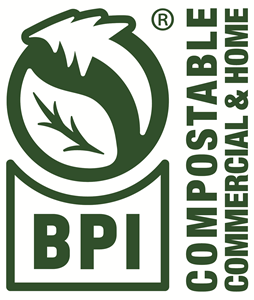BPI Launches Commercial & Home Compostable Certification Program, Bringing Food Waste Diversion to Our Backyards
Top composting standards group makes it easier than ever for packagers and consumers to divert more food scraps from landfills
NEW YORK and ATLANTA, Sept. 18, 2025 (GLOBE NEWSWIRE) -- The Biodegradable Products Institute (BPI) has officially announced its new Commercial & Home Compostable Certification program, unveiling it today at the BPI Summit 2025 in Atlanta. BPI's new certification offers a scientifically rigorous framework to clearly identify products that safely break down in home compost piles, enabling more households to participate in the circular bioeconomy through a known certification that consumers already trust. The program will officially launch, and BPI will begin accepting applications on Dec. 1, 2025.
To earn the new certification, products must break down completely in the lower temperatures of backyard composting environments in addition to meeting existing certification criteria. Limiting components such as PFAS, carcinogens, endocrine disruptors, and heavy metals in products helps ensure that compost containing certified-compostable packaging can meet the highest standards. The home composting thresholds were validated through extensive field testing across North American climates and composting practices, identifying management practices needed to set performance expectations. In the coming months, BPI will launch additional educational resources to help individuals achieve success composting certified products in their own backyards.
"When it comes to composting, we all can be part of the solution—we just need the right tools and information to get started," said Rhodes Yepsen, BPI's Executive Director. "This new certification addresses pent-up consumer demand, empowering individuals to divert more food scraps and food-soiled packaging into their backyard compost bins at a time when curbside and drop-off compost options remain limited for most American households. Our goal is to achieve widespread access to composting, and this certification gets us one step closer, acknowledging that composting can happen at different scales to meet diverse needs across the country."
Food scraps remain the top material being sent to landfills, which in turn are the third largest contributor of methane in the U.S., a greenhouse gas that is up to 80 times more potent than carbon dioxide. Studies show that certified compostable packaging increases food scrap diversion and ultimately reduces compost contamination, plastic pollution, and methane emissions. Compost creates additional pathways for carbon sequestration and healthier soil systems to support sustainable agriculture and combat desertification. According to the EPA, while the technology for large-scale composting exists, it will take over $14B to build the infrastructure required to bridge the gap.
"Home composting represents an immediate climate action that households can take today while we pursue the policies and investments needed to scale composting of all sizes nationwide," said Brenda Platt, Director, Composting for Community at the Institute for Local Self-Reliance. "These standards are long overdue and critically important to combat greenwashing."
The strict standards associated with BPI’s logo on packaging create trust in labeling. By linking the Commercial & Home Compostable Certifications, professional composters can trust that products will work in their system and consumers can have confidence in sustainable packaging claims with clear instructions for end of life. Home compostability gives brands an avenue to make validated packaging claims without accusation of using terms often associated with “greenwashing.” BPI currently certifies over 51,000 products as commercially compostable, from food scrap collection bags to takeout containers and consumer food packaging.
"Consumers shouldn't have to struggle to decipher what’s actually compostable in their backyard versus what products should be sent to a professionally managed compost facility," said Margaret Eldridge, BPI's Certification Director. "We have manufacturers queued up for this new certification because they want to use a verified third-party claim that their customers are familiar with and trust. This certification gives both product manufacturers and consumers the same scientific rigor as our commercial program, just adapted for backyards—expanding the impact of sustainable packaging to millions more households."
In addition to its labeling and certification efforts, BPI champions the transition to a circular bioeconomy from many angles. Most recently, BPI helped lead the development of two ASTM standards (D8618 and D8619) for field testing, supporting composters looking to accept certified compostable packaging by defining a range of acceptable conditions, and detailed instructions on how to run a trial in their facilities.
The Commercial & Home Certification was unveiled at the BPI Summit 2025, a three-day event titled “Societal Transition to a Circular Bioeconomy: Building Trust During Non-Linear Progress.” Similar to BPI’s webinars and committee forums, the BPI Summit convenes leaders from across the circular bioeconomy to explore business models, policy frameworks, and solutions for progressing toward a zero-waste society.
About Biodegradable Products Institute
The Biodegradable Products Institute (BPI) is North America's leading authority on compostable products and packaging, certifying over 50,000 products from collection bags to food containers. For more than two decades, BPI has given consumers confidence in compostability claims with the backing of science-based standards, while enabling authentically sustainable choices for brands and packagers. BPI champions a systems-wide transition to the circular bioeconomy through rigorous testing, policy advocacy, and industry collaboration, building the infrastructure for "A World Without Organic Waste"—where food scraps and certified compostable packaging become resources. BPI is a non-profit 501(c)(6). To learn more, visit www.bpiworld.org and follow us on LinkedIn.
Media Contact
bpi@launchsquad.com
A photo accompanying this announcement is available at https://www.globenewswire.com/NewsRoom/AttachmentNg/20129dfe-2f4d-4683-bb9a-17ff8236a5b9

Legal Disclaimer:
EIN Presswire provides this news content "as is" without warranty of any kind. We do not accept any responsibility or liability for the accuracy, content, images, videos, licenses, completeness, legality, or reliability of the information contained in this article. If you have any complaints or copyright issues related to this article, kindly contact the author above.

